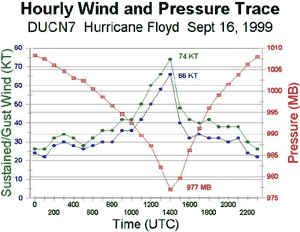 |
|||||||||||||||||||||||||||||||||
|
Hurricanes
Witness Account
In September 1999, Hurricane Floyd dumped 60 inches of water on North Carolina and forced 48,000 people to seek emergency shelter. Kaleatha Vines, 14, saw her home destroyed, her town in chaos, and her best friend disappear. For several days as Hurricane Floyd approached, the TV news ran constant flood warnings. But nobody in my town of Tarboro, North Carolina, thought it would really happen. Soon, we learned how terribly wrong we were. On September 15, at 3 a.m., a policeman knocked on our door and told us that the water was coming. The dam that held back the river two miles behind our house was near the bursting point. They had to release it. They asked us to evacuate. My parents and I got in the car, but after only a few minutes on the road, we turned around. "It's not really going to flood," my dad said. But I barely slept that night. THE WATER'S RISING I screamed, "Mom, Dad, we need to get out! The water's rising!" I packed one outfit in my book bag, and my parents grabbed a few things. We couldn't find our dog, Bear. But we just had to leave. As we drove through the water to a shelter at Tarboro High, I looked back at our house and cried. I had to leave my posters on the wall, my school supplies, my books... everything. LOVED ONES MISSING The helicopters overhead sounded like thunder. When they landed, people started streaming out of them. Everyone was soaking wet. Many people were crying. As each person climbed out of the helicopters, I thought, "Here's my friend!" But none of them were her. She didn't show up at all that day. I called her house but the phone was not working. I thought for certain she was dead. A TOWN DESTROYED After the water receded, my family and I were allowed to go back to our house to try to rescue some of our things. When we opened the door, we had to move furniture just to get in. During the flood, all of the furniture had floated to the front door. I could see my shoes in the living room, and I just grabbed them and left. I couldn't bear to see my ruined bedroom. Everything I'd ever owned was in that room — even my blanket and pillow that I'd had since I was a baby. That blanket was my heart. That pillow was my heart. And the water destroyed it all. THE AFTERMATH I had found my friend, but I was about to lose my home. Our house had to be torn down. There was no way to fix the damage from the flood. So when it was time, we went over to watch. They had a tractor that just broke it apart and demolished it. We'd been at that house ever since I was born. My mom was crying really hard. It would have taken too long to build a new house, so we bought a double-wide trailer to put down on our property. We moved in last February. If I could give advice to someone who lives where a hurricane or flood is about to hit, I would say, "Please — evacuate!" It's truly better to spend a night at a shelter and have nothing happen than to put yourself at risk of death. I think that might be why some people died during Hurricane Floyd. They didn't believe it was going to happen. They said, "If there hasn't been a flood or a hurricane here before, we don't have to worry about it." But sadly, they were very wrong. I am really thankful that my family survived the flood, and didn't have to move back into a wrecked house. Fifty-two people died in the flood. Others didn't have anywhere to go after the shelter closed, and had to return to destroyed homes. We were able to get a new home, and I'm very grateful for that. From: |
||||||||||||||||||||||||||||||||

